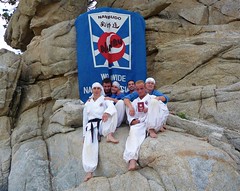It has been too many years since I went to Playa de Aro for a nanbudo seminar. It has been the same for many years: I have been looking forward to attend both weeks and when things got complicated (only one week at best) I let it go.
This time it was originally supposed to be a two week thing. But the plans changed when my accommodation buddies informed me that they would be attending only the latter week. Anyways, I thought one week is a lot better than nothing for many years. A lot better.
The accommodation in Playa de Aro is always a bit tricky. Hotels are very expensive and even camping costs approximately the same than having an apartment. The problem with the last solution is that one propably needs to know some Spanish to get in. This time things were taken care of for me. Our group had one half-Spanish person who was in charge of booking the accommodation.
So there we were, a mixed group. I was the only one from Finland, there were two Croatians and three French, one of which was half Spanish. There was a slight clash of cultures. The Finnish way is not to be too social all the time and every once in a while I took my time in solitude. Others found this a bit peculiar and maybe even thought I was upset or something. Hey buddies, this was not the case. You were the best company I could have ever dreamed of!
Technically the seminar consisted broad spectrum of nanbudo, of course. Our training included (but were not limited to) all the shihotai katas with their bunkai, Nanbu sotai aiki techniques, all Nanbu keiraku taiso katas as well as some more simple Nanbu no ki kind of energy practices. Not to mention the "female kata" kaguya hime. This was a new kata by Nanbu, which was premiered earlier in the female only seminar in Sandefjord, Norway.
Because I was already experimenting nanbudo with senior citizens I naturally wanted to talk about it and share experiences. It turned out that my project seemed to be kinda unique, having my group a lot older than my peers. A Hungarian nanbudoka was amazed that I was training with people around 80-90 years old. "In Hungary people tend to die before that age" he said.
The week flew by quickly and the number one thing on my mind afterward was that next time I have to make it for both weeks. My thanks go to our group: Jana and Julien, Edija and Nicolas and the other Julien. Thanks also to Grega and Marina, who let me sleep at their accommodation for my last night in Playa de Aro when the rest of my group had already headed home.
Kalle Lönnroth, 2 dan
